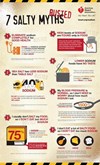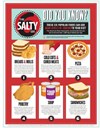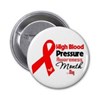Posted 6/21/2014
by American Heart Association

Seven salty myths to help control our daily sodium intake.
For the 77.9 million adults in the United States dealing with high blood pressure, controlling their sodium intake has turned into a matter of life and death. Contributing to 200,000 female deaths each year, high blood pressure has been named the leading risk factor for death in American women. On top of high blood pressure, too much sodium in our diet can result in various health complications, including type 2 diabetes, stroke, heart failure, kidney disease, obesity, and certain types of cancer. The recommended daily allowance of sodium is 1,500 milligrams, although the average American consumes upward of 3,400 milligrams. Here are seven salty myths offered by the American Heart Association to help control the amount of sodium we include in our diet:
Posted 6/14/2014
by http://www.fruitsandveggiesmorematters.org

Whether organic or conventionally grown, a diet rich in fruits and vegetables has positive health benefits. Decades of scientific studies in nutrition and toxicology continue to show that the benefits of eating fruits and vegetables outweigh any risks. Our Fruits, Vegetables, and Health: A Scientific Overview, 2011 describes the multiple positive effects a diet rich in fruits and vegetables has on the human body. Among this information is new data that suggests diets rich in fruits and vegetables have positive effects on aging, cognitive function, and eye health among other mechanisms. This is regardless of conventional or organic growing methods.
Posted 6/14/2014
by Sabrina Bachai, Medical Daily

Nine out of 10 Americans consume more than the daily recommended amount of salt.
Salty foods can cause a number of health problems, including high blood pressure, stroke, heart failure, osteoporosis, stomach cancer, kidney disease, kidney stones, enlarged muscle heart, and headaches.
Posted 6/7/2014
by NUTRITION AND YOUR CHILD – NUMBER 1 - 2014

Summer is a welcome respite from the rigor and routine of the school year for many children but unfortunately it can often lead to weight gain.
A study led by Dr. Jennette Moreno of the USDA/ARS Children’s Nutrition Research Center at Baylor College of Medicine showed that children gained weight during the summer but lost weight during the school year.
Posted 5/31/2014
by CDC

Bones play many roles in the body. They provide structure, protect organs, anchor muscles, and store calcium. Adequate calcium consumption and weight bearing physical activity build strong bones, optimizes bone mass, and may reduce the risk of osteoporosis later in life.
Posted 5/31/2014
by FDA Consumer Updates

Can an aspirin a day help you ward off a heart attack or stroke?
That depends.
Scientific evidence shows that taking an aspirin daily can help prevent a heart attack or stroke in some people, but not in everyone. It also can cause unwanted side effects.
According to Robert Temple, M.D., deputy director for clinical science at the Food and Drug Administration (FDA), one thing is certain: You should use daily aspirin therapy only after first talking to your health care professional, who can weigh the benefits and risks.
Posted 5/24/2014
by http://www.nhlbi.nih.gov

You can take steps to prevent high blood pressure by adopting a healthy lifestyle. These steps include maintaining a healthy weight; being physically active; following a healthy eating plan, that emphasizes fruits, vegetables, and low-fat dairy foods; choosing and preparing foods with less salt and sodium; and, if you drink alcoholic beverages, drinking in moderation. In this section you will learn more about healthy lifestyle habits for preventing and controlling high blood pressure.
Posted 5/24/2014
by American Heart Association

Finding added sugars in food
Unfortunately, you can’t tell easily by looking at the nutrition facts panel of a food if it contains added sugars. The line for “sugars” includes both added and natural sugars. Naturally occurring sugars are found in milk (lactose) and fruit (fructose). Any product that contains milk (such as yogurt, milk or cream) or fruit (fresh, dried) contains some natural sugars.
Reading the ingredient list on a processed food’s label can tell you if the product contains added sugars, just not the exact amount if the product also contains natural sugars.
Posted 5/17/2014
by USDA

Deciphering food labels and marketing claims can be a challenge for the average consumer. Companies use production and handling claims as a way to differentiate their products in the marketplace. Organic is one label that most consumers are familiar with, but understanding what “organic” really means can help consumers make informed choices.
Posted 5/17/2014
by http://www.fruitsandveggiesmorematters.org

May is Asparagus Month. Check out the following top 10 ways to enjoy asparagus.
















